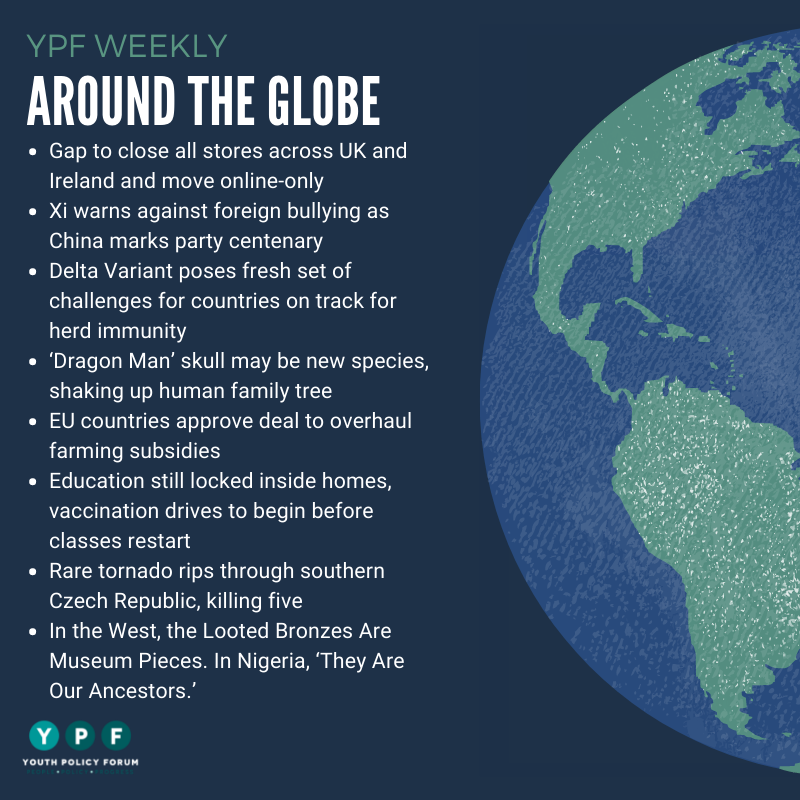Timeframe: 26th June – 1st July 2021
Contributors:
Sabyasachi Karmaker, Musarrat Sarwar Chowdhury, Mansib Khan, and Farhan Uddin Ahmed.
1. Economics & Business
Gap to close all stores across UK and Ireland and move online-only
Gap will close all 81 of its stores in the United Kingdom and Ireland by the end of September and go fully online, as the brand adjusts to changes in shopping habits following the pandemic. The American apparel retailer, which owns Old Navy and the Banana Republic, said in a statement that the closures will affect company-operated stores. It added that plans were also underway to sell its outlets in France and Italy.
Source: BBC
2. Politics
Xi warns against foreign bullying as China marks party centenary
China’s President Xi Jinping on Thursday warned that foreign forces attempting to bully the nation will “get their heads bashed”, and hailed a “new world” created by its people as the ruling Communist Party marked the centenary of its founding.
Source: Reuters
3. Significant Corona Update
Delta Variant poses a fresh set of challenges for countries on track for herd immunity
While the WHO attributes the lowest number of cases worldwide since February 2021 as a result of the expanded vaccination programs across high-income countries, a renewed Delta variant has spread to 92 countries now. The EU states are grappling with removing outdoor mask restrictions while Asian countries find a renewed surge calling for lockdowns across ASEAN and South Asia – further reinforcing the global call for vaccine equity. Australia, an early success story, finds itself repeatedly snuffing out outbreaks in Sydney, and having an uncertain way out with vaccine drives ramping up slowly. Israel too has reimposed mask-wearing as the Delta variant hits the nation considered to have achieved herd immunity – an immunity at risk of a mutating variant that has now afflicted Africa as well. Against 403,837 cases per day, a daily vaccination of 40.2 million will hopefully reach across both rich and poor countries.
Source: The Guardian
4. Science & Technology
‘Dragon Man’ skull may be new species, shaking up the human family tree
The strange skull appeared soon after the Japanese invaded northeast China in the early 1930s. The nearly complete human skull had an elongated cranium from which a heavy brow bone protruded, shading the gaping squares that once housed eyes. Now, nearly 90 years later, a study published in the journal The Innovation makes the case that this skull represents a new human species: Homo long, or the Dragon Man.
Source: National Geographic
5. RMG/ Agriculture
EU countries approve a deal to overhaul farming subsidies
European Union countries on Monday gave the green light to reforms of the bloc’s huge farming subsidy program, after a three-year battle over rules to make it greener and support smaller farms. Negotiators representing the EU’s 27 countries and European Parliament struck the deal on Friday to reform the Common Agricultural Policy (CAP), which will spend 387 billion euros ($462 billion) on payments to farmers and rural development, roughly a third of the EU’s 2021-2027 budget.
Source: Reuters
6. Social and Education
Education still locked inside homes, vaccination drives to begin before classes restart
Another month of delays still schools restart, as vaccination campaign starts from this week. With 472 days of schools, colleges, and universities being closed there seems to be a digital divide growing between students able to take classes and appear in exams online, and those who have to get out to work to boost family income.
Source: Dhaka Tribune
7. Environment
Rare tornado rips through the southern Czech Republic, killing five
A rare tornado along with tennis ball-sized hailstones has swept through several villages in the Czech Republic, killing five people and leaving more than 150 others injured. Winds of at least 219km/h (136 mph) were recorded and the worst-hit areas were said to look like a war zone.
Source: CNN
8. Expert Opinion
In the West, the Looted Bronzes Are Museum Pieces. In Nigeria, ‘They Are Our Ancestors.’
When British soldiers stole the treasured works in 1897, it left a gaping hole in an ancient culture. With a few set to return to Nigeria, can their meaning be restored- asks Ruth Maclean and Alex Marshall in the New York Times?
Source: The New York Times
Disclaimer: The information provided here is obtained solely from the third parties mentioned above. Youth Policy Forum (YPF) is not responsible for any misinformation or misrepresentation.
